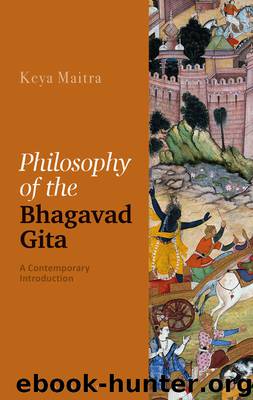Philosophy of the Bhagavad Gita: A Contemporary Introduction by Keya Maitra

Author:Keya Maitra [Maitra, Keya]
Language: eng
Format: epub, azw3
Publisher: Bloomsbury Publishing
Published: 2018-03-21T23:00:00+00:00
Philosopher’s corner: Chapter analysis and questions for consideration
Krishna presents Purusha and Prakriti as his two aspects or two natures. This portrayal thus seems to attempt to transcend the dualism prominent in some schools of Hindu philosophy, Samkhya for example, that consider Prakriti and Purusha as two distinct ontological entities. It remains unclear, however, how these two natures might interact or what could be the mechanism of such an interaction. It is also an interesting question to consider what Krishna’s exact relation is to these two natures. Does he stand over and above them or is he constituted by these two natures? If the latter, does that make his own nature divisible? Further, how important it is to answer these metaphysical questions for a full delineation of the liberating knowledge that Krishna recommended in Chapter 7.
Krishna seems to explain the mechanics underlying the Hindu concepts of rebirth and karma here. The basic idea, as Krishna introduced in Chapter 2, is that every individual goes through numerous rebirths after the death of the present body unless he has already realized his sameness with Krishna. One’s next birth is determined by the karmic residues of one’s actions in present and past lives. In this chapter Krishna further proposes, “whatever state of being a man remembers while leaving his body at the time of death, to that state alone he enters due to his ever persistence in it” (8.6). His suggestion here that one’s mental states at the time of death determine the form of rebirth in the next life can be taken as the Gita’s effort to operationalize the relationship between karmic residue and rebirth. Like the statement, “you are what you eat,” the Gita here seems to be suggesting, “You will be what you think and focus on especially at the time of death.” So if a yogi’s mind is focused on Krishna alone at the time of his death—however hard it might be to attain that kind of purity of thought—then he attains Krishna after death (8.13). The reason a yogi’s mind might be so focused is because one’s mental world is shaped by one’s disposition and cultivation of mental attitudes up to that point. That is to say, the makeup of one’s karmic residue count at one moment in turn determines one’s mental content and attitude in the next moment so that the mental state at the time of death is shaped by one’s previous mental discipline and cultivation of attitudes like non-attachment. So since a yogi “focuses on nothing else [but Krishna], remembers [him] constantly” (8.14), his mental reality is such that he will be focused on Krishna at the time of death. Such a yogi will thus attain Brahman, Krishna’s “supreme abode” (8.21), and will be freed from the cycle of rebirths (8.15). Drawing from other Hindu scriptural sources, the Gita tries to enumerate certain signs, for example, “sun’s six-month northward course” (8.24), to indicate whether a yogi while dying during that period will attain freedom from rebirth.
Finally,
Download
Philosophy of the Bhagavad Gita: A Contemporary Introduction by Keya Maitra.azw3
This site does not store any files on its server. We only index and link to content provided by other sites. Please contact the content providers to delete copyright contents if any and email us, we'll remove relevant links or contents immediately.
Fingersmith by Sarah Waters(2532)
Kundalini by Gopi Krishna(2180)
Wheels of Life by Anodea Judith(2144)
Indian Mythology by Devdutt Pattanaik(1936)
The Bhagavad Gita by Bibek Debroy(1928)
The Yoga of Jesus: Understanding the Hidden Teachings of the Gospels by Paramahansa Yogananda(1847)
Autobiography of a Yogi (Complete Edition) by Yogananda Paramahansa(1823)
The Man from the Egg by Sudha Murty(1806)
The Book of Secrets: 112 Meditations to Discover the Mystery Within by Osho(1659)
Chakra Mantra Magick by Kadmon Baal(1638)
The Sparsholt Affair by Alan Hollinghurst(1585)
Sparks of Divinity by B. K. S. Iyengar(1531)
Gandhi by Ramachandra Guha(1528)
Avatar of Night by Tal Brooke(1519)
Karma-Yoga and Bhakti-Yoga by Swami Vivekananda(1488)
The Bhagavad Gita (Classics of Indian Spirituality) by Eknath Easwaran(1477)
The Spiritual Teaching of Ramana Maharshi by Ramana Maharshi(1426)
Hindoo Holiday by J. R. Ackerley(1374)
Hinduism: A Very Short Introduction (Very Short Introductions) by Knott Kim(1372)
